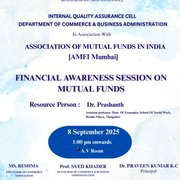Financial Awareness Session on Mutual Funds: Department of Commerce and Business Administration
The Department of Commerce and Business Administration of Besant Women’s College, under the Internal Quality Assurance Cell (IQAC), in collaboration with the Association of Mutual Funds in India (AMFI), Mumbai, organized a Financial Awareness Session on Mutual Funds on 8th September 2025 at 1:00 p.m. in the college A.V. Room.
The session aimed to promote financial literacy among students and help them understand the importance of investing in mutual funds as a means of disciplined savings, wealth creation, and long-term financial security.
In today’s fast-evolving financial world, it is essential for students — especially those pursuing commerce and management — to be aware of various investment avenues and the regulatory mechanisms that ensure transparency and investor protection. This session provided a comprehensive understanding of the concept, working, and benefits of mutual funds.
The session was conducted by Dr. Prashanth, Assistant Professor in the Department of Economics, School of Social Work, Roshni Nilaya, Mangalore. Dr. Prashanth has extensive knowledge in the areas of economics, finance, and investor education. His session combined
theoretical clarity with practical insights, making complex financial concepts easy to understand for students.







